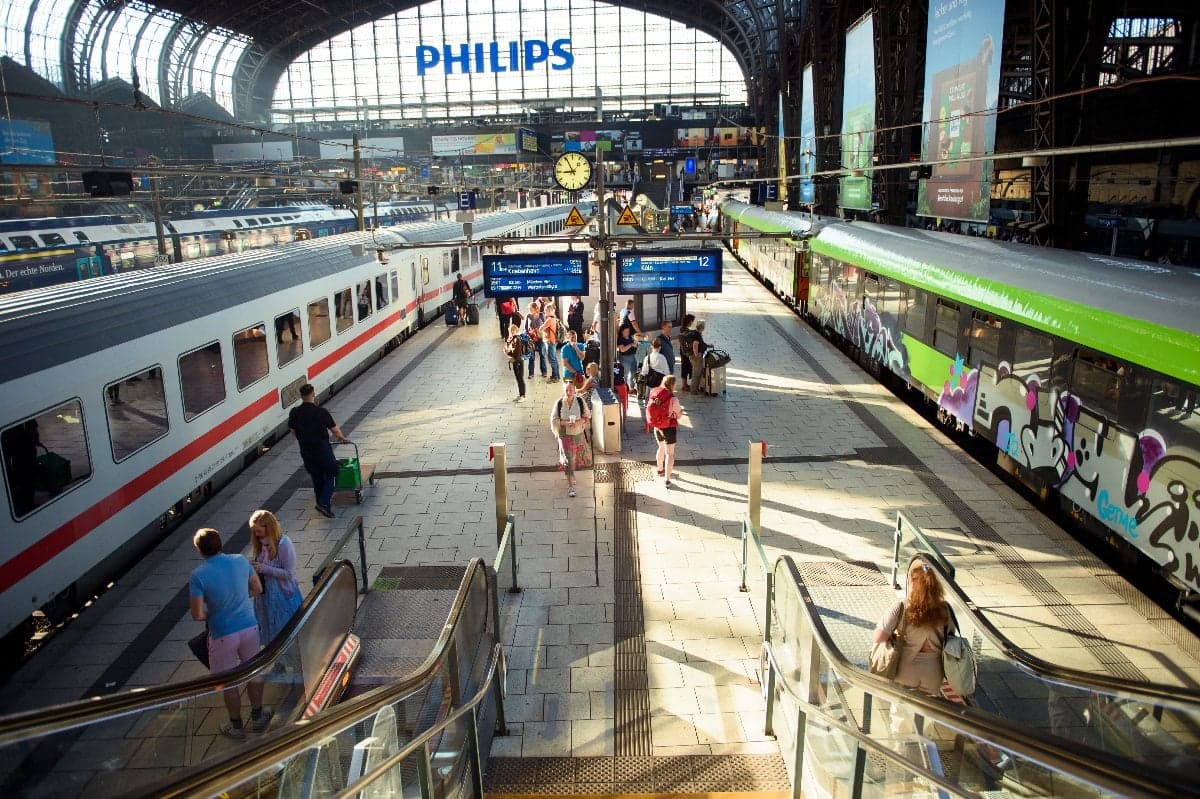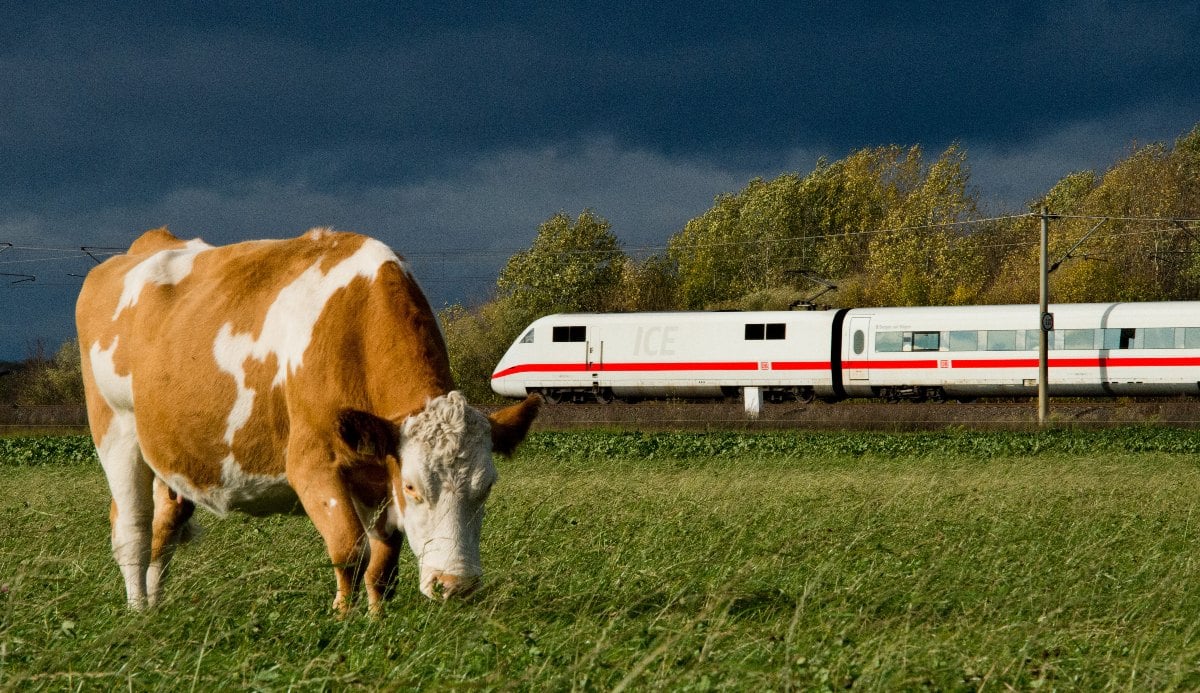Why has German train punctuality got so bad?

Deutsche Bahn recorded one of its worst ever punctuality rates in June, with around half of long-distance trains reportedly arriving late to their destination. Why is punctuality getting worse?
Germany’s state-run railway operator Deutsche Bahn may have just set a new record - but it's not a good one.
According to figures obtained by German newspaper Bild, every second long-distance train (ICE, IC) arrived late to its destination in June.
The newspaper claims that only 52.5 percent of long-distance trains arrived on time during the month. It led Bild to run with the headline: 'Bummel-Bahn! Unsere Züge verspäten sich so oft wie nie' ('Slow railway! Our trains are running late more often than ever before')
Deutsche Bahn has not confirmed these figures, saying it plans to publish the stats later this month.
However, a spokesperson did blame recent delays on the weather. Germany has seen a series of storms and flooding recently.
"The extreme weather conditions in the first half of June put a massive damper on punctuality," a DB spokesperson told Bild.
"In June 2024, we recorded the highest number of weather-related delays in long-distance transport ever measured. On average, over 400 long-distance trains per day were affected by external factors such as landslides, flooding and dam damage."
Deutsche Bahn considers a long-distance train to be on time if it arrives at the station less than six minutes late. Train cancellations and missed connections are not factored into the statistics.
Why are things getting worse?
As The Local has reported, passengers have seen punctuality rates in Germany plummet in recent years.
READ ALSO: OPINION - The shocking state of German trains exposes the myth about punctuality
In January of this year, 63 percent of trains arrived on time. In March, that figure was just under 68 percent.
But a year-on-year comparison shows just how bad the situation has become.
Punctuality has been recorded since 2012 and was initially constant at around 75 percent.
In 2020, the punctuality rate even managed to reach just under 82 percent (although this was perhaps due to reduced traffic in the pandemic) and in 2021 it was back to around 75 percent. Then real problems started to emerge. In 2023, only 65 percent of long-distance trains were on time in Germany.

Dark clouds above an ICE train near a field in Hanover. Photo: picture alliance / dpa | Julian Stratenschulte
Detlef Neuß, Federal Chairman of the Pro Bahn passenger association, told Bild that he believes the problems are due to the state of the infrastructure.
"Our railway system is dilapidated, the infrastructure has been run down for decades and too little money has been invested in the railway system," he said.
According to Neuß, the low punctuality rate is mainly due to construction works. Added to this are unplanned problems that crop up such as signalling faults.
The increased passenger volume during a large event like Euro 2024, which started in June and runs until mid-July, contributes to delays, according to Pro Bahn. "Where large numbers of passengers crowd onto a train, the time spent waiting in the station is extended, which adds up to delays," Neuß said.
But Deutsche Bahn was keen to point out that millions of travellers are using IC and ICE trains across Germany at the moment. This could be party down to special offers provided to football fans to encourage them to travel to Euro matches by train.
"There has never been so much rail travel at an international football tournament as at the European Championships in Germany,"a DB spokesperson said.
What are rail bosses in Germany doing about the delays?
Deutsche Bahn has vowed to improve Germany's sprawling railway network.
By 2030, DB plans to invest €16.4 billion in a comprehensive infrastructure programme, with the aim of renewing about 2,000 kilometres of track, 2,000 points as well as upgrading several stations and bridges.
However this is resulting in more delays in the short-term.
For instance, on July 15th, general refurbishment of the Riedbahn, which connects Frankfurt and Mannheim gets underway. The line will remain closed until December 14th resulting in train diversions and rail replacement services.
READ ALSO: Where to expect disruption due to rail upgrades in Germany this year
Regardless of what is causing the surge in delays, Germany's deteriorating punctuality rates in recent years have not gone unnoticed by both passengers and other countries.
Neighbouring Switzerland last year proposed stopping Deutsche Bahn trains in Basel in its new service concept for 2035, and getting passengers to switch to more reliable Swiss trains.
The German government's short-term goal is to get 70 percent of trains to run on-time and to increase this to 80 percent by 2030. Is this possible? Watch this space.
READ ALSO: How one simple rule could help German trains arrive on time
Comments
See Also
Germany’s state-run railway operator Deutsche Bahn may have just set a new record - but it's not a good one.
According to figures obtained by German newspaper Bild, every second long-distance train (ICE, IC) arrived late to its destination in June.
The newspaper claims that only 52.5 percent of long-distance trains arrived on time during the month. It led Bild to run with the headline: 'Bummel-Bahn! Unsere Züge verspäten sich so oft wie nie' ('Slow railway! Our trains are running late more often than ever before')
Deutsche Bahn has not confirmed these figures, saying it plans to publish the stats later this month.
However, a spokesperson did blame recent delays on the weather. Germany has seen a series of storms and flooding recently.
"The extreme weather conditions in the first half of June put a massive damper on punctuality," a DB spokesperson told Bild.
"In June 2024, we recorded the highest number of weather-related delays in long-distance transport ever measured. On average, over 400 long-distance trains per day were affected by external factors such as landslides, flooding and dam damage."
Deutsche Bahn considers a long-distance train to be on time if it arrives at the station less than six minutes late. Train cancellations and missed connections are not factored into the statistics.
Why are things getting worse?
As The Local has reported, passengers have seen punctuality rates in Germany plummet in recent years.
READ ALSO: OPINION - The shocking state of German trains exposes the myth about punctuality
In January of this year, 63 percent of trains arrived on time. In March, that figure was just under 68 percent.
But a year-on-year comparison shows just how bad the situation has become.
Punctuality has been recorded since 2012 and was initially constant at around 75 percent.
In 2020, the punctuality rate even managed to reach just under 82 percent (although this was perhaps due to reduced traffic in the pandemic) and in 2021 it was back to around 75 percent. Then real problems started to emerge. In 2023, only 65 percent of long-distance trains were on time in Germany.

Detlef Neuß, Federal Chairman of the Pro Bahn passenger association, told Bild that he believes the problems are due to the state of the infrastructure.
"Our railway system is dilapidated, the infrastructure has been run down for decades and too little money has been invested in the railway system," he said.
According to Neuß, the low punctuality rate is mainly due to construction works. Added to this are unplanned problems that crop up such as signalling faults.
The increased passenger volume during a large event like Euro 2024, which started in June and runs until mid-July, contributes to delays, according to Pro Bahn. "Where large numbers of passengers crowd onto a train, the time spent waiting in the station is extended, which adds up to delays," Neuß said.
But Deutsche Bahn was keen to point out that millions of travellers are using IC and ICE trains across Germany at the moment. This could be party down to special offers provided to football fans to encourage them to travel to Euro matches by train.
"There has never been so much rail travel at an international football tournament as at the European Championships in Germany,"a DB spokesperson said.
What are rail bosses in Germany doing about the delays?
Deutsche Bahn has vowed to improve Germany's sprawling railway network.
By 2030, DB plans to invest €16.4 billion in a comprehensive infrastructure programme, with the aim of renewing about 2,000 kilometres of track, 2,000 points as well as upgrading several stations and bridges.
However this is resulting in more delays in the short-term.
For instance, on July 15th, general refurbishment of the Riedbahn, which connects Frankfurt and Mannheim gets underway. The line will remain closed until December 14th resulting in train diversions and rail replacement services.
READ ALSO: Where to expect disruption due to rail upgrades in Germany this year
Regardless of what is causing the surge in delays, Germany's deteriorating punctuality rates in recent years have not gone unnoticed by both passengers and other countries.
Neighbouring Switzerland last year proposed stopping Deutsche Bahn trains in Basel in its new service concept for 2035, and getting passengers to switch to more reliable Swiss trains.
The German government's short-term goal is to get 70 percent of trains to run on-time and to increase this to 80 percent by 2030. Is this possible? Watch this space.
READ ALSO: How one simple rule could help German trains arrive on time
Join the conversation in our comments section below. Share your own views and experience and if you have a question or suggestion for our journalists then email us at [email protected].
Please keep comments civil, constructive and on topic – and make sure to read our terms of use before getting involved.
Please log in here to leave a comment.